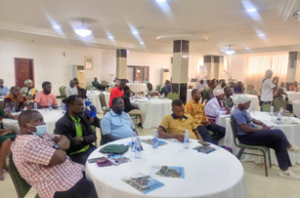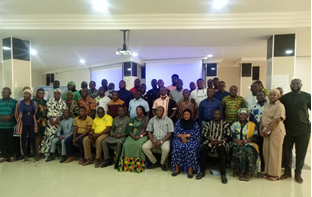The STAR-Ghana Foundation has called on the government to increase the budgetary allocation to education from the current 12 percent to, at least, 15 percent of the total national budget to enhance quality education, particularly for rural communities.
The foundation made this appeal during the ‘CSOs Thematic Forum on Education’ held in Tamale under the Inclusive Elections and Accountable Governance in Ghana Project (Phase III). The forum brought together civil society organisations (CSOs), non-governmental organisations (NGOs) and education stakeholders to discuss strategies for tracking government commitments, strengthening advocacy and improving educational outcomes in Ghana.
According to stakeholders at the forum, prioritising the disbursement of allocated discretionary education funds would address the low budget execution rate that has hindered the delivery of quality education. They emphasised that the proposed budget increase—amounting to over GH¢4.3billion—should be directed toward addressing critical challenges such as the construction of 5,000 schools currently operating under trees, sheds and dilapidated structures.
Call for urgent education reforms
Stakeholders also urged the government to deploy desks to all 2.3 million pupils in underserved schools, and develop an emergency infrastructure expansion plan to address overcrowding in urban and peri-urban schools.
The plan, they said, must bridge the 25 percent gap between primary and junior high school (JHS) enrolment while ensuring the establishment of new schools in underserved communities.
Furthermore, the forum recommended that the government discontinue the procurement of laptops for senior high schools and redirect those funds toward improving infrastructure and ensuring the full availability of textbooks at the basic education level.
Recommendations on education financing and policy
Addressing participants, the Project Manager for Rights to Services at STAR-Ghana Foundation, Raymond Danso, called for diversification of funding sources for the Capitation Grant to include the Annual Budget Funding Amount, which is considered more reliable. He stressed the need for annual increments to be benchmarked against inflation data.
“The government must disburse approved funds for financing arrears and the current cost of feeding in special schools and under the Ghana School Feeding Programme. Additional allocations must be made in the 2023 supplementary budget to address these inadequacies,” he stated.
Danso also called for the depoliticisation of teacher recruitment by removing Members of Parliament from the process. He urged the government to implement a long-recommended 20 percent allowance for teachers serving in deprived areas. Additionally, he advised that the implementation of the secondary education strategy should be paused until consultations with teachers and civil society organisations are held to inform its review.
Concerns over educational performance in deprived communities
The Executive Director of STAR-Ghana Foundation, Alhaji Ibrahim Tanko Amidu, highlighted the poor academic performance of students in deprived communities, stressing its long-term implications on national development.
“The poor performance of students is tied to human capital development, and until the root causes are identified and addressed, it will be difficult to resolve the challenges facing Ghana’s education system,” he stated.
He reaffirmed the organisation’s commitment to working with stakeholders to address key national issues and promote active citizenship, social inclusion and a responsible civil society.

In a related statement, Hajia Alima Sagito-Saeed, Executive Director of the Savannah Women Integrated Development Agency (SWIDA), called for gender inclusivity in the formulation of educational policies to bridge existing disparities.
Ragadahu Abdul-Wahab, who leads STAR-Ghana’s Right to Service portfolio, also emphasised that the forum was a platform to gather stakeholder input on policy measures needed to enhance quality education in Ghana.










